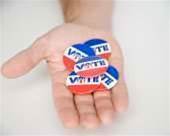
The 2007 election was seen by many as ushering in a new era of political discussion and communication, with campaigns like Kevin ’07 and John Howard’s infamous YouTube addresses.
Macnamara and his team examined more than 700 websites of the 226 sitting politicians, the four key political parties, and six political interest and activist groups to see if Australian politics truly live up to the hype.
They found that the ‘YouTube election’ greatly misrepresented the online prowess of Australian politics.
“Overall, it has to be said that all the claims of the ’YouTube election,’ the internet election, are an exaggeration,” Macnamara said.
“There is a lot of hype and it’s way too early to pronounce that there is a new public sphere and a new level of interactive politics or digital democracy as some people call it.”
Of the 226 politicians studied, only 11.5 percent had a MySpace page, despite ABC’s claim that politicians had “invaded” the site.
Overall, Macnamara said politicians used an average of 2.24 types of online media, with 61 percent using a personal website, 6.6 percent writing a blog, and 5.75 percent appearing on YouTube.
Though Kevin ’07 gave the Labour Party a net savvy appearance and was lauded by many as a huge step forward for online politics, Macnamara said there was no real difference between parties in the online realm, and that even Kevin ’07 had some major faults.
“When we cracked it open, we found that almost all sections of it were controlled by gatekeepers,” Macnamara said.
“So we had a group of students typing in comments, including really nasty ones, and they never, ever got replies.”
Indeed, the majority of the sites examined used this type of one-way dialogue, with only 46 of the 226 politicians providing personal email addresses for feedback, and 225 only posting positive “fan mail” comments on their sites.
The only politician who posted negative user comments about himself was MP Malcolm Turnbull.
Macnamara believes that in the future, politicians will focus more on establishing an open dialogue with constituents, rather than providing them with a one-sided conversation as in the last election.
“Government and business are nervous, even paranoid about the dialoguing interaction,” he said.
“There’s fear of criticism, there’s fear it will get out of control, there’s fear of the avalanche, there’s fear of loss of control.”
“Somehow or other there seems to be a public expectation of openness and engagement, and you could argue that the last Federal election has created some of that expectation.”



_(20).jpg&h=140&w=231&c=1&s=0)







 iTnews Executive Retreat - Security Leaders Edition
iTnews Executive Retreat - Security Leaders Edition
 iTnews Benchmark Awards 2026
iTnews Benchmark Awards 2026
 iTnews Cloud Covered Breakfast Summit
iTnews Cloud Covered Breakfast Summit
 The 2026 iAwards
The 2026 iAwards












_(1).jpg&h=140&w=231&c=1&s=0)



